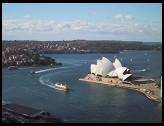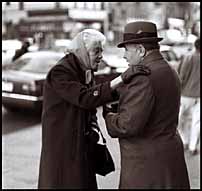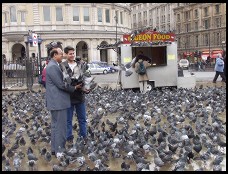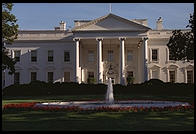
A Global Life
reviewed by Philip Greenspun; February 2011
Site Home : Book Reviews : One Review

|
A Global Lifereviewed by Philip Greenspun; February 2011
Site Home : Book Reviews : One Review |
A Global Life: My Journey Among Rich and Poor, from Sydney to Wall Street to the World Bank
is the autobiography of James Wolfensohn, former president of the
World Bank. This is a remarkably straightforward and useful
book. Failures are not glossed over. When a company is sold,
Wolfensohn says exactly how much he made out of the transaction.
Born in 1933, Wolfensohn grew up in Australia, the son of an English Jew who emigrated in 1928, just in time for the Depression to thwart his dreams of success in the Antipodean world. The family never wanted for food, but everything else was a struggle and Wolfensohn expresses satisfaction that he was able eventually to lift all financial concerns from his parents and buy all of the things that he had ever wanted as a young man, e.g., a country house in Australia, a gold coin collection, etc. Lesson: sometimes money can buy happiness.
Wolfensohn commutes from home to Sydney University where his poor study habits very nearly result in disaster. With the help of family friends he pulls through, wanders onto the college fencing team, and decides, in 1952, that he is going to be on the Australian Olympic fencing team for 1956. He practices four nights a week and walks into the Olympic stadium in 1956.
As a measure of how much less bureaucratic the world was back then, Wolfensohn is able to talk his way onto a New Zealand military flight to London on his way to Harvard Business School where he is able to talk his way into letting them credit his two-year half-scholarship into paying 100 percent of the tuition, room, and board for the first year. (The sum was $3000, which, adjusted for inflation, is less than one third of the current $80,000 annual cost.)
Going to Harvard opens up the entire world to Wolfensohn. MBAs were scarce and being able to perform a simple net present value calculation distinguished him from the average banking executive worldwide (today, of course, the NPV function is built into Excel, OpenOffice Calc, and Google Spreadsheets). Wolfensohn makes it sound as though he could work almost anywhere in the world for almost any firm and they'd be happy to have him for a duration of his own choosing. He applies for a highly paid research position at a Swiss business institute and tells them frankly that he wants to spend more time touring around Europe than grinding away at the office. He's hired.
Wolfensohn returns to Australia to run a "private investing and an advisory service", starting with a fund of about $30,000 from his HBS classmates. He loses nearly all of it with a couple of misjudged choices and, after that, basically spends the rest of his career in fee-based activities rather than taking on underlying business risk. (Perhaps the best lesson of Harvard Business School is that actual "business" must be avoided due to the unhedgeable risks.)
Wolfensohn has some successes in fee-based banking in Australia, but eventually a nasty public breakup with the old-line firm that he'd joined. Perhaps the world was more forgiving then, perhaps investment banking is much more forgiving than industry, or perhaps Wolfensohn's exceptional talent was obvious even at a young age, but the setback did not stop Wolfensohn's fans in London from offering him a job immediately.
According to Wolfensohn, the U.S. Government created a massive financial industry in London by creating "the U.S. Interest equalization tax, introduced in 1963 as an attempt to keep money from flowing out of the United States. As a foreigner, if you wanted to borrow in the United States, your interest would be subject to a 15-percent interest equalization tax... This created the booming 'Eurodollar' market."
Wolfensohn personally finances a classical music artist management service and is introduced to the greatest musicians of the era, e.g., Vladimir Ashkenzay, Daniel Barenboim, and Jacqueline du Pre.

Wolfensohn doesn't say this, but his talent seems to have resulted in frequent installations at the top of organizations that weren't necessarily happy to take orders from a newcomer. The book has a few episodes that illustrate Wolfensohn's head-on approach to tackling conflict. He shows up to head the New York office of his London bank and tells the assembled office backstabbers "I know you're not happy, but I am staying. I know you think I am not properly trained... but I have been chosen. I have been appointed, I am staying, and I am going to make a success of this bank." Wolfensohn has the big fight first, invites anyone who doesn't like it to leave, and then starts building relationships afresh. Similar scenes play out when negotiating with Japanese bankers owed money by Chrysler or when Wolfensohn takes charge of the Multiple Sclerosis International Federation.
Wolfensohn discloses his salary as an investment bank CEO in New York circa 1970: $120,000. The banks then were partnerships rather than today's public companies and executives couldn't loot from shareholders because they would simply have been stealing from themselves.
One of the most disturbing lines of the book is "These years in New York confirmed my belief, nurtured in London, that to be bearable, a business life must be something more than deal making. A career has to be pursued in a social and cultural context." In other words, if you can't live in Manhattan or London and be friends with some of the world's most accomplished artists, you might as well kill yourself. What's the businessman in Akron, Ohio to do? What's the New York deal-maker who isn't in James Wolfensohn's league to do?
Looking in from the outside, America's non-profit system doesn't appear to be something that a person passionate about social change would want to participate in. Why would a middle class person donate money, for example, to the New England Home for Little Wanderers, so that the president of the organization, Joan Wallace-Benjamin, could pay herself nearly $400,000 per year (see the organization's 2009 IRS Form 990, available from guidestar.org, and look at Schedule J)? Why would someone passionate about keeping classical music alive for future generations donate money to Carnegie Hall, where an average stagehand (guy who rolls pianos around between performances) makes about $500,000 per year (Bloomberg.com), rather than to fund an Internet service that would license and distribute for free all of the classical music catalog to all of the world's citizens (could be done for about the same cost as paying a couple of stagehands at Carnegie, according to my non-profit ideas page). Wolfensohn's book and example makes clear the value of the non-profit system.
Wolfensohn describes carefully his rise in the business, social, and government worlds through serving on non-profit organization boards. He describes a seamless world where a contact made to solicit a donation to renovate Carnegie Hall turns into an important connection to get a deal closed ("We decided to capture the interest of Sandy Weill, then president of American Express"). "This great institution linked me to New York and its inhabitants in a way that perhaps no other could have. There was no real wall between my work and my social activities." Or how serving on the board of the Kennedy Center in Washington, D.C. eventually leads to being chosen to head the World Bank.
Page 205: "My business, social, and cultural activities coalesced... As I sought to do business in other cities and countries there was always a second layer to the business conversation. Music, water shortages, the environment, the rights of women, education--these were the subjects that built the special connections with friends and clients."
An important lesson is that one should never start one's own non-profit organization, at least not until one's business career is fully established. No matter how inefficient an existing non-profit might be, giving it enough money to get onto the board is the path to making important connections.

Wolfensohn returns to London to take a job with a big title at Schroders, but the new job comes with little authority and a lot of office politics. The lack of satisfaction in the job is compensated for by the purchase of a $60,000 Guarnerius cello and lessons from Jacqueline du Pre, sadly already suffering from MS. Wolfensohn would start every morning at the office by practicing on the Guarnerius or du Pre's Stradivarius, kept in the vault at Schroders and eventually sold to Yo-Yo Ma, "who become my good friend and occasion teacher." [The reviewer was once friends with a business executive in Boston who would drop the name of "my friend Yo-Yo" into nearly every conversation, e.g., if you said were going to Stop & Shop to get some eggs she would respond "Yo-Yo and I went to Stop & Shop once." The reviewer began to refer to the great artist as "Yo Ma-Ma" and the friendship soon ended. Years later, the cellist came to the reviewer's office in Cambridge seeking advice on an online community to support his Silk Road project. An important phone call came in and I hollered out "tell them I'm in a meeting with Yo-Yo Ma and can't talk." Saying simply "I'll call them back" would have done just as well, but the urge to name drop "Yo-Yo" was too powerful to be resisted.]
Wolfensohn is eventually outmaneuvered for the chairmanship at Schroders. In retrospect he blames himself for not being sufficiently attuned to office politics but also sees some merit in the board's choice. Not everyone can be friends with Yo-Yo Ma, so Wolfensohn's example of immersion in the world of high culture cannot be followed by most readers. On the other hand, everyone could benefit from adopting Wolfensohn's example of responding to setbacks. He doesn't sulk. He doesn't brood. He just picks up and move on to the next opportunity, working the network of the folks who believe in him.
Wolfensohn describes his rebound from Schroders:
I contacted three people. First, I called Frank Petito, chairman of Morgan Stanley... I had developed a friendship with him during several fishing trips to Alaska, where each of us was the guest of Continental Oil Corporation. Frank could not offer me an immediate partnership at Morgan Stanely, because of a requirement that new aspirants work their passage within the firm for at least twelve months... Next, I met with David Rockefeller of Chase Manhattan, with whom I had a friendship already more than a decade old. He immediate offered to propose me for a top-level executive post at his bank. Finally I called Bill Salomon, chairman and senior partner at Salomon Brothers, the dynamic New York investment banking house.
Wolfensohn joins Salomon, puts in the $100,000 severance he got from Schroders. He finds an apartment through "Elie and Marion Wiesel, friends from our earlier New York days", rents for a while, and eventually buys the 12-room apartment across from the Metropolitan Museum for $86,000 (some time in the early 1980s; the place would be worth $3 or 4 million today?). "In subsequent years, we have taken pride in Elie's reputation in literature and beyond and were delighted when he won the Nobel Prize."
Wolfensohn builds up the Salomon corporate finance and advisory department and plays a big role in Jimmy Carter's bailout of Chrysler (the reviewer almost wrote "the federal government's bailout of Chrysler", but that would have been ambiguous due to the 2009 bailout; Wolfensohn does not address the question of how many times the American taxpayer should have to buy Chrysler). This project gives Wolfensohn a lot of introductions to high government officials as well as contacts in the auto industry that leads to later work with "Ford Motor Company, the Ford family, and Daimler-Benz, which eventually acquired Chrysler."
Although the Chrysler deal made him a superstar, Wolfensohn says that the time that he spent on it strained his relations with partners at Salomon.
"One day, I had a surprise visit from Robert Roosa, former undersecretary of the Treasury and senior partner in Brown Brothers, and Steve Smith, husband of Jean Kennedy. The legendary investment banker Andre Meyer of Lazards had recently died, and they were seeking a new trustee for the Kennedy Family Trust." Wolfensohn goes to "a major gathering of the clan, and before dinner, Ted spent an hour walking me around the house, pointing out family memorabilia. ... I was enchanted. I had glimpsed the private world of America's royal family, and I was ready to become a Kennedy acolyte. As I sat next to Teddy during a fine dinner with exceptional French wine, I felt proud to have been invited and elated at the prospect of working with the family."
"I became especially close to Senator Kennedy, with whom I worked on many issues within and outside the trust. Elaine and I were greatly saddened by his death and were privileged to pay tribute to him at his funeral."
[If Wolfensohn was sad that Mary Jo Kopechne and her family were not able to enjoy a fine dinner and exceptional French wine, he does not say so. Nor does Wolfensohn say how he feels about the trust fund enabling the family to enjoy late-night drinking at Au Bar in Palm Beach prior to the events that lead up to the William Kennedy Smith rape trial.]
Wolfensohn cashes out from Salomon with about $10 million (page 208) when the company is acquired by Philbro in 1981. He then starts his own firm, a fee-based investment bank called "James D. Wolfensohn Incorporated". The firm is immediately successful due to Wolfensohn's good reputation and extensive network of friends and contacts.
Things are going really well until 1983 when Wolfensohn decides to go back into taking business risk: "I put together a high quality group of advisers to help us invest in high-tech business, including Nobel Prize-winner Joshua Lederberg; Harold Brown, who had been secretary of defense under Jimmy Carter [let's hope he didn't plan the Iran hostage rescue!]...; MIT professor John Deutch, who would later become a high official in the Department of Defense and thereafter director of the Central Intelligence Agency; and Gene Fubini, a former distinguished scientific adviser to the U.S. government. With this outstanding team, I thought we must be onto a winner. ... We formed a $90-million joint-venture firm, Wolfensohn Associates, in which many leaders and friends, including David Rockefeller, ..., Gordon Getty, ... each took a $5-million stake."
Wolfensohn describes the failure of this venture capital fund and most of his other forays into anything that resembled venture capital or an operating business. His one big winner was Southeast Frozen Foods (SEFF), a wholesale food distributor.
The rest of the pre-World Bank years are spent helping companies complete mergers and relaxing with family and friends, e.g., Bill and Hillary Clinton, at a Cesar Pelli-designed retreat in Jackson Hole, Wyoming.

The chapters on the World Bank offer a lot of ammunition to critics of the World Bank. Wolfensohn notes that the countries with viable political and economic systems are able to get all of the financing that they want from profit-seeking investors, such as "regular old banks". In countries that private investors won't touch, the leaders generally convert World Bank funds, and anything else not nailed down, into personal consumption and Swiss bank accounts. It is the the International Monetary Fund that steps in during crises, so why exactly do we need the World Bank? Wolfensohn never explains.
One of Wolfensohn's big projects was debt-forgiveness for hopeless countries: "the external debt of Mali at the time was slightly larger than its total GDP." If this is the right metric, the U.S. is in worse shape than Mali, owing closer to 500 percent of GDP (our government debt isn't quite as high as Mali's was, but we have public employee pension, Medicare, and Social Security obligations that presumably dwarf anything that a poor country would have).
Wolfensohn defends the sybaritic lifestyle of World Bank employees: "The Bank had a reputation for providing very generous benefits to its employees, many of whom are paid on a tax-free basis. They often travel business class and, occasionally, first class. Their salaries and benefits certainly far exceed those at most NGOs. ... [The Bank] drew to its portals the best and the brightest development experts from more than 140 countries, including more PhDs than many of the world's great universities. ... It was essential for us to attract and retain such talent."
[The reviewer has some personal experience with the World Bank, which was a customer of an enterprise software company that he founded and ran. In fact, the software we ("we" being "me and Andrew" when the project began) built with the Bank is described on page 330: "We also launched the Development Gateway, a set of Internet tools that provide practitioners in the field of development with easy access to information: an up-to-date listing of development activities, portals for countries to present themselves to the world, e-procurement to increase transparency and reduce costs, Internet sites where communities of practice can exchange experience and learn from one another, and, more recently, a tool for countries to manage the flow of their aid resources. After incubation within the World Bank, both World Links and the Development Gateway were spun off, with all the excitement and angst of start-ups ... . Today they are permanently staffed, and they represent real achievements of the young people in the Bank who created them."
We definitely noticed some differences in working with the World Bank. In explaining what our software did and negotiating the contract, we had to sit on the opposite side of a big conference table from all of the Bank employees, so that we wouldn't be able to give a briefcase full of cash to anyone. The employee cafeteria at the World Bank included private dining rooms with waiter service and food rivaling some of the better restaurants in Washington. When we were taken out for dinner, the Bank employees ordered a bottle of wine that cost more than our round-trip airfare from Boston. It was certainly a welcome change from taking a tray through the cafeteria at the headquarters of our regular clients (e.g., Siemens, Oracle, Hewlett-Packard).]

A lot of super rich guys and Miss America contestants have one goal in common: World Peace. When Andrew Carnegie sold his steel company in 1901 and became the richest person in the world, he decided that he would abolish war. That the world's deadliest war to date, World War I, followed just four years after the establishment of the Carnegie Endowment for International Peace, was a bitter setback.
Wolfensohn is more modest than Carnegie in his ambitions and concentrates on achieving peace between Israelis and Palestinians, starting in 2005 when George W. Bush selects Wolfensohn to be "special envoy of the Quarter to the Middle East", the "Quartet" being the U.S., Russia, the European Union, and the United Nations. How successful was he? Well, there were the 2006 Lebanon War and 2008-2009 Gaza Wars, for starters (see my Israel article for my personal analysis).
Wolfensohn admits failure in bringing peace to the region, and is not shy about blaming various U.S. politicians and officials. He never questions whether or not the World Bank and United Nations might have been part of the problem rather than the solution (the UNRWA takes care of basic Palestinian needs and the World Bank gives money for infrastructure projects) . The Palestinians have been able to obtain food, shelter, and education for 60 years without doing what most folks have to do to obtain these things, i.e., go to work. As long as the UN and World Bank money taps remain flowing, the Palestinians can survive for another 60 or 600 years without compromising on their war aims.
Older and wealthier readers might be excused for dipping into this book looking for guidance in their personal investing. The answer? "In 2007, [my children and I] raised a fund of $250 million to invest in banking, retailing, and clean energy principally outside the United States in the BRIC countries-Brazil, Russia, India, and China. ... We have been fortunate in our investments so far and are now seeking to expand our interests in our energy portfolio."
Wolfensohn has been absolutely everywhere. The country that he seems to be fondest of is Bhutan.
A Global Life contains no charts or graphs and just a few photographs of the author standing next to various dignitaries. As such it would be fine for reading on a mostly-text device such as a Kindle or mobile phone.
According to the book, the author is worth at least a few hundred million dollars. As the plot of the work does not lend itself to a Hollywood blockbuster, we can infer that his motive in writing was not financial gain. Why would he want to limit his audience to those who have $30 to spend? Wolfensohn often expresses concern for poor Africans. How many of them will be able to spend a month's income on a book? Yet an ever-growing number of the world's poor have Internet access. It is ironic that a relatively poor guy like Jimmy Wales (Mr. Wikipedia), who never said that his life mission was to help the impoverished, is delivering free reading material to Africa while Jim Wolfensohn withholds it.
The Internet should be the greatest thing that ever happened to the world's poor, since it has reduced the marginal cost of disseminating knowledge to zero. It seems a pity that such a powerful advocate for the world's poor has fallen back to Johannes Gutenberg's high-cost 1439 technology rather than today's low-cost technology.

Wolfensohn's autobiography was published at roughly the same time as Amy Chua's memoir,
Battle Hymn of the Tiger Mother.
Chua prepares her children for what she believes will be a harsh
meritocracy and their superior skills will enable them to find
happiness and prosperity. Wolfensohn describes his rise through a
world where personal charm is a much more important asset than having
the brightest analytical mind and personal connections, often forged
in social or non-profit contexts, are the ultimate currency.
An individual might be better off following Wolfensohn's example, perhaps eventually rising to the top of Wall Street or the U.S. government. Society, however, would probably be much better off if everyone followed the example of Amy Chua's children, cultivating personal excellence. After all, only a few people can reach the top of our various pyramids. Do we want a world in which the folks at the base are charming and connected but incompetent?
Everyone could benefit if everyone adopted Wolfensohn's attitude toward failure, i.e., to acknowledge that it occurred, to try to learn a little something from it, but mostly to move on immediately without looking back.
Most of the world's wildly successful people take the secrets of their success with them to the grave. Wolfensohn has made a rare, sincere, and mostly successful attempt to explain how he got to be where he is. For that, those of us who have $30 to spare should be grateful.